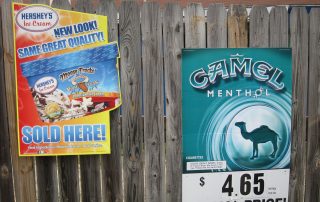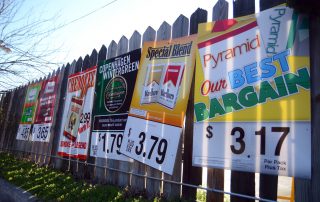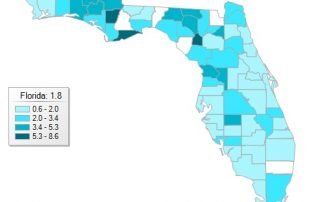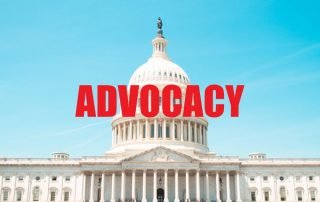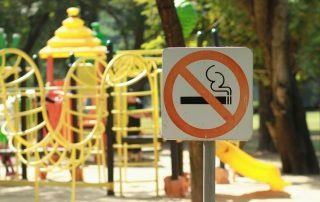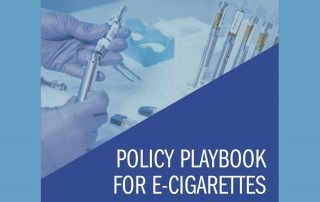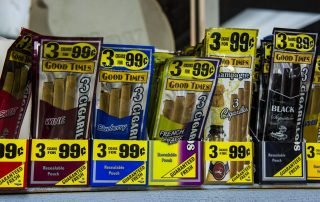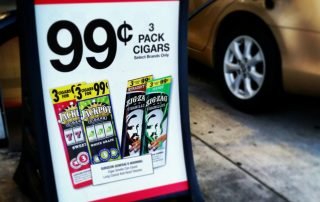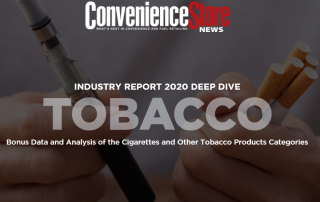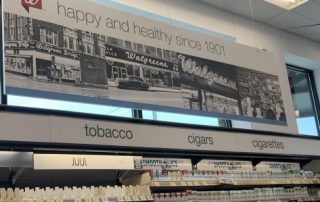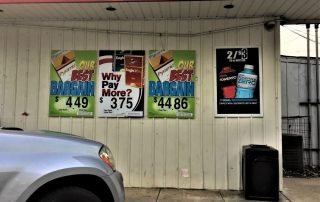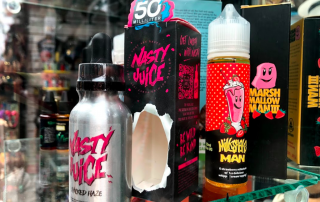Counter Tobacco Podcast: Endgame (Episode 25)
Our latest podcast episode describes the “endgame” for commercial tobacco control toward a tobacco-free future. Learn about possible strategies and examples of places that are already implementing endgame policies. Endgame strategies have been defined as “initiatives designed to change/eliminate permanently the structural, political, and social dynamics that sustain the tobacco epidemic, in order to end [More]
A Moment of victory: FDA moves to ban menthol cigarettes and flavored cigars
The Biden Administration’s announcement yesterday that the FDA will take action to prohibit menthol cigarettes and flavored cigars is a long-awaited victory that will advance health equity and protect health for all, especially for Black Americans and kids. We celebrate the originators of this movement and those who have been persistent in this long fight [More]
Addressing Health Disparities Through Alcohol Outlet Density
There are many ways the COVID-19 pandemic has changed our daily lives. One of many interesting public health observations is the impact of the pandemic on alcohol consumption. Thanks in part to many bars and restaurants being closed at some point during the last year, off-premise alcohol sales saw a significant spike in spring 2020 [More]
Counter Tobacco Podcast: Equitable Enforcement in Commercial Tobacco Control Policy (Episode 24)
In this episode, we talk with Natasha Phelps, a Lead Senior Staff Attorney at the Public Health Law Center, about the recent statement on “Decriminalizing Commercial Tobacco: Addressing Systemic Racism in the Enforcement of Commercial Tobacco Control” that was released last year by a consortium of public health organizations. We take a deeper dive into [More]
Geographic Surveillance Learning Collaborative 2020 – Highlights from Tobacco Control Programs
The Geographic Health Equity Alliance (GHEA) and Counter Tools facilitated the inaugural Geographic Surveillance Learning Collaborative for National Tobacco Control Programs and National Comprehensive Cancer Control from May to September 2020. In order to participate, interested states were required to establish a three-person team consisting of a statewide representative from each of the following fields: (1) tobacco control, (2) comprehensive cancer control and [More]
Letter to FDA on Menthol Cigarettes and other Flavored Tobacco Products
The undersigned public health, medical, education and community organizations write to urge prompt action by the Food and Drug Administration to prohibit menthol cigarettes and other non-tobacco flavored tobacco products, including e-cigarettes and cigars. The public health and medical community has long been united in calling on FDA to use its authority under the Family [More]
Key Components of a Comprehensive Tobacco Control Program
Limiting the availability of products like tobacco helps protect those most vulnerable and improves the health of all. Here are some key considerations for implementing a comprehensive tobacco control program. Tobacco prevention and control work is a key part of public health. We know that tobacco use is the single most preventable cause of disease, [More]
Success Story: Using Local Data to Pass Policies for Tobacco Prevention in Golden Valley, Minnesota
We have a new success story about one of our partners that serves as a great example of a local area passing strong tobacco prevention policies. In 2019, the city of Golden Valley in Hennepin County, Minnesota passed a number of comprehensive tobacco prevention policies, and in June 2020, they passed additional regulations to restrict [More]
UNC and PHLC release Policy Playbook For E-cigarettes
University of North Carolina's Vaping Prevention Resource and Public Health Law Center recently released the Policy Playbook for E-cigarettes. The Playbook provides state and local stakeholders with a framework of policies and practices to pursue, guidelines on policy implementation, case studies, and examples. As a supplement, Public Health Law Center is hosting a webinar this [More]
Tobacco Retailer Licensing Considerations for Rural Communities
In the United States, rates of tobacco use are higher in rural than urban populations, yet rural communities often lack the tobacco control policy coverage present in more urban areas. While there are several reasons why policy adoption may be more challenging in rural areas, some rural communities have found success with local-level tobacco control [More]
Letter to FDA on Prohibiting Menthol Cigarettes
The undersigned public health and medical organizations write to urge the Food and Drug Administration (FDA) to grant the pending Citizen Petition referenced above and commence the requested rulemaking to prohibit menthol as a characterizing flavor in cigarettes. The menthol Citizen Petition was filed over seven years ago and has yet to receive a substantive [More]
Nebraska passes T21 policy and adds electronic smoking devices to their Clean Indoor Air Act
Counter Tools is thrilled to congratulate Nebraska, one of our partnering states, on two exciting policy victories! LB1064 This bill makes Nebraska the 33rd state to pass statewide T21 legislation. By raising the minimum legal sale age (MLSA) to 21, the state now aligns with the federal law, which helps to reduce consumer and retailer [More]
California passes ban on the sale of flavored tobacco products
We’re excited by the news that California’s State Assembly recently passed a bill prohibiting the sale of flavored tobacco products, including menthol cigarettes. We know that the tobacco industry has long targeted Black communities and youth with flavored products. Prohibiting the sale of flavored tobacco products may increase cessation rates and decrease initiation, improving overall [More]
Reducing Tobacco Disparities with Minimum Floor Price Laws
According to the Surgeon General, raising the price of tobacco products is one of the most effective strategies for reducing initiation, decreasing consumption and increasing cessation. While excise taxes are a common strategy for increasing tobacco prices, minimum floor price laws are another promising non-tax strategy with the potential to reduce health disparities. Each day, [More]
Highlights from the Convenience Store News 2020 Tobacco Report
Despite public health’s success in tobacco policy over the recent years, we know tobacco remains a top source of revenue for the convenience store industry. In order to identify appropriate policy interventions or other point of sale strategies for tobacco prevention and control, it’s helpful to understand consumer trends. A look at the “Tobacco Deep [More]
Secondhand Smoke Exposure: A Social Justice Issue
Many states and localities have adopted comprehensive smoke-free laws. However, there are over 58 million Americans still exposed to secondhand smoke today. A closer look at which communities are left unprotected reveals clear health inequities and points to a need for smoke-free protections for all as a strategy to advance social justice. The idea that [More]
Counter Tobacco Podcast: Tobacco-Free Pharmacies (Episode 16)
Pharmacies are licensed healthcare facilities uniquely positioned to provide healthcare services and health advice directly to community members across the US. Yet, many pharmacies still widely promote and sell tobacco products, the leading cause of preventable disease and death in this country. This episode focuses entirely on tobacco-free pharmacies. We’ll hone in on evidence-backed research, [More]
Counter Tobacco Podcast: Tobacco Retailer Licensing (Episode 15)
Tobacco retail licenses (TRLs) are one of the most lasting and effective strategies in tobacco control. In addition to letting states and localities know who is selling tobacco, licensing is an evidence-based way to reduce tobacco use; it also offers a versatile regulatory platform that allows jurisdictions to implement additional policies that can further reduce [More]
Place Matters for our Health, and Tobacco Retailers Play a Significant Part
Over the last few years, several corporate-owned chains and franchise stores have made commitments to reducing youth tobacco access. Conversely, other franchises have started selling tobacco, which has increased tobacco retailer density in some regions. These changes can have a significant impact on a community's tobacco retail market depending on the geographic location of that [More]
Counter Tobacco Podcast: A Look at the Federal Flavor Ban & Tobacco 21 (Episode 13)
Over the past few months, we’ve seen a lot of changes to the regulatory environment surrounding tobacco products. This episode highlights the new federal flavor ban and Tobacco 21 law, as well as what some states and local jurisdictions have done to advance tobacco control and what your locality could do to support strong tobacco [More]


